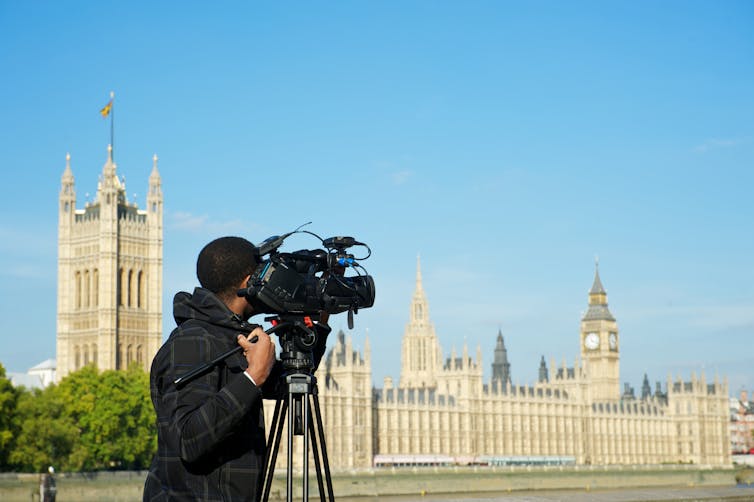Politics
BBC plan for regional hubs makes financial sense and is good politics for the government – The Conversation UK

The BBC is calling it a “blueprint for the biggest transformation in decades”. The UK’s national public service broadcaster has announced plans to move hundreds of journalists’ jobs and some programme commissioning out of London, to strengthen both local reporting and the creative economy in the UK’s nations and regions.
With hard questions about the BBC’s long-term financial future being asked, it is one of new director general Tim Davie’s big initiatives to win over a sceptical government that does not believe the BBC represents a balanced view of Britain.
Despite vibrant creative sectors outside of London, politicians have long worried the capital has too large a slice of the creative economy, with almost one in three creative jobs based there. But relocating posts means existing members of staff face uncertainty about the future.
The Conservative government has made it plain that it does not believe its supporters’ views are given enough prominence by the broadcaster. It’s a view that has been reinforced by recent opinion polling.
But Cardiff University research has discovered that, despite noisy criticism from the right, there is no evidence that the BBC’s news coverage leans to the left. Indeed, one study found that during the Brexit referendum, politicians from right-wing parties were quoted five times as often as those in the centre or left of centre parties.
Read more:
BBC ‘Brexit bias’ claims need to be based on hard evidence
The BBC intends to use the drive to get out of London to better reflect the makeup and views of other parts of the UK. Too often England has been treated as the default setting. But just because BBC2’s Newsnight is broadcast from Cardiff or Manchester a handful of times a year, does not mean that stories about viewers living in those cities are any more likely to get on air. Or – perhaps worse – there is a risk of clumsy, patronising stories being produced because London-based journalists on tour do not understand the nuances of local issues.
London calling?
One of the big questions that a regionalisation strategy must answer is: to what extent are the teams independent of the view from London? A programme that is commissioned locally and broadcast to a regional audience should be largely independent of London. A specialist team based in the nations or regions that is pitching stories to London-based programme makers will still have to take account of the view from W1A.
The big success story for regionalisation has been the development of the BBC’s northern base at MediaCityUK in Salford. The move of BBC Breakfast, 5 Live and BBC Sport has breathed new life into the media scene in the north-west. But that success is often analysed in economic terms – the extent to which has it aided the regeneration of Salford – rather than in demonstrating plurality or diversity of views in news coverage.
SAKhanPhotography via Shutterstock
After all – notwithstanding its success in recent years, BBC Breakfast has tended to follow a similar news agenda to other morning news shows that are based in London.
Economies of place
Senior editors at BBC News believe the regionalisation plans are a radical shake up that will use the best of BBC journalism across more broadcast and digital platforms and that will cut down on repetition.
The BBC has long faced criticism that it doesn’t make the best use of its resources. All too often, different programmes have deployed their own teams to report the same story. Meanwhile some high-profile and well-paid journalists work exclusively for one programme. That’s now unaffordable.
According to the consumer group Voice of the Listener & Viewer (VLV), since 2010 cuts have reduced the net public funding of the BBC’s UK services by 30% in real terms. With BBC News cutting back on staff as it strives to implement a further £80m worth of cuts announced in January, there’s a strong case for more sharing of content between different show. An interview recorded for BBC 5 Live, should be equally at home on Radio 4’s Today programme. Gone are the days of programmes rejecting content just because it was made by a rival part of the BBC.


PeskyMonkey via Shutterstock
The COVID-19 crisis has made it clear that even traditionally newsroom-based journalists and production staff can work from home, meaning cost-cutting on offices is an inevitability. If guests can be interviewed via Zoom and viewers will accept lower-quality production values on-air, then broadcasters no longer need to maintain expensive regional studios and newsrooms.
A new culture?
ITV was established in the 1950s as a truly regional public service broadcaster, with franchises and bases around the UK. But during the pandemic, one senior ITV executive told me that its response to the crisis meant the company was getting out of the bricks and mortar business for good.
Journalists will have to come to terms with the culture change of working from either a large regional hub or from home. That is especially true for people starting out in their careers, as some older hands have pointed out.
A balance of risks and benefits then for the BBC in its move to push jobs and commissioning outside of London.
But there is one other big winner in all of this. The UK’s government. The Conservative party’s scepticism of the ongoing and future value of the BBC has meant that it has been able to strong-arm the Beeb into backing its “levelling-up” agenda.
For a party with an eye on both the post-COVID recovery and the election of 2024, there is a lot to be said for moving jobs and money to parts of the country that, perhaps surprisingly, backed it in 2019. That may just be the price for putting up with the status quo in BBC funding for another decade.
Politics
Are settler politics running unchecked in Israel? – Al Jazeera English


In Israel, the far right is increasingly influential in politics, with a government reliant for its existence on a settler movement driving an ever-more extreme agenda.
Analysts point out that settler and ultra-right-wing voices have come to dominate the cabinet, providing legal and political cover for even more expansion into internationally recognised Palestinian territory, and underpinning much of the ferocity of Israel’s war on Gaza.
And yet, despite that, and irrespective of the international criticism of Israel that continues to grow, the United States continues to fund it.
US lawmakers in the Senate voted on Tuesday, by an overwhelming majority, to transfer $17bn in military aid to Israel.
Celebrating the passage of the bill, House House Majority leader Chuck Schumer told the Senate: “Tonight we tell our allies: ‘We stand with you.’
“We tell our adversaries: ‘Don’t mess with us.’ We tell the world: ‘The United States will do everything to safeguard democracy and our way of life.’”
Settlers and politics
But in Israel, “democracy” and the system that Schumer and other US politicians back involves the illegal settlement of occupied Palestinian land, displacing the native population, and creating a dual system of governance, with Jews ruled under Israeli civil law, and occupied Palestinians under military law.
These settlements now dot much of the occupied West Bank, either gathering in established clusters, or in outposts that even the Israeli state deems illegal, but does little about.
As their numbers and political support have grown, settlers have become more confident, attacking Palestinian villages in well-armed and coordinated raids, occasionally with military support, and evicting Palestinian villagers.
In tandem with the expansion of the settlements has been a wider rightward drift across Israeli society, which saw the country elect its most right-wing parliament or Knesset in its history in November 2022.
Among its members are extreme-right provocateur Itamar Ben-Gvir – convicted of incitement in 2007 – who acts as national security minister, and Finance Minister Bezalel Smotrich, whose claims to Palestinian territory in the occupied West Bank run counter to international law.
“The settler and far-right movements have been growing rapidly within Israel for years, to the point where forming a government is impossible without participation from right-wing parties opposed to territorial compromise with Palestinians,” Omar H Rahman of the Middle East Council on Global Affairs said.
Ben-Gvir and Smotrich, members of the right-wing coalition cabinet of Prime Minister Benjamin Netanyahu, speak to a growing constituency characterised as “messianic” in its approach to Palestinians and their land, according to analysts.
Settlers’ ideologies – which claim, among other things, a religious justification for their taking of Palestinian land – have been a growing political presence since the 1967 war, which resulted in Israel occupying the Gaza Strip, the Sinai Peninsula, the West Bank, and East Jerusalem.
“The US has played a significant role in this rightward shift by ensuring Israel’s impunity for relentless illegal settlement building, thereby undercutting those within Israeli politics who warned of the consequences of unfettered expansionism,” Rahman said. “This demonstrated to the Israeli public there would be no penalty for supporting those in Israel who want all the land ‘between the river and the sea’.”
Israel has seemingly run a violent campaign in the occupied West Bank in parallel to its war on Gaza, which followed a Hamas-led attack into Israel in which 1,139 people were killed and some 200 taken into Gaza.
As of March of this year, 7,350 Palestinians had been arrested by Israeli forces across the West Bank, many without charge and with no hope of due process.
In the last few days, rights group Amnesty International has sharply criticised settler attacks on Palestinians and what it calls the established system of apartheid that reigns in the occupied West Bank.
In the days following the discovery of the body of 14-year-old Binyamin Ahimeir, himself from an illegal Israeli West Bank settlement, hundreds of settlers went on a deadly rampage between April 12 and 16, torching homes, fruit trees and vehicles.
By the end of their attack, four Palestinians lay dead, killed by either settlers or Israeli military forces, Amnesty said, including Omar Hamed, a 17-year-old boy from near Ramallah.
An estimated 487 Palestinians have been killed in the occupied West Bank in attacks by armed settlers, often supported by security forces according to witnesses, or by security forces in near-nightly raids on towns and refugee camps and in other incidents.
Israel’s war on Gaza has killed at least 34,262 people. The true figure is likely far higher.
Netanyahu and the settlers
While Netanyahu has officially rejected settler ambitions for Gaza, he does have two settler ministers in his cabinet and the movement is continuing to grow.
Expectations that prime minister Netanyahu might act as a check on settler ambitions have also proven ill founded. Since at least 2015, both he and his Likud party have been joining with the extreme elements of the right by running campaigns noted for their dog whistle racism, Eyal Lurie-Paredes of the Middle East Institute said.


“It’s not just about the present,” Lurie-Paredes added, “It’s about the future.
“Most political party, not just Likud, has ever really opposed the settlements. They’re a winning card. The main two sectors of the population of settlers – national orthodox and ultra-orthodox – have the highest birth-rate among Israeli Jews high birth-rates. Out of Jewish first graders, more than 40 percent belong to these groups.
Additionally, Israeli governments have created a more enhanced welfare state in the West Bank for Jews, offering them better infrastructure and cheaper housing – which or drive people to move there and increase their belonging to the settler movement” he added.
Referring to the years leading up to Israel’s founding in 1948, Tel Aviv-based analyst Dahlia Scheindlin said “Settler politics have always been there.”
“However,” she noted, “it had never really been especially religious. That element only really entered the political mainstream after the 1967 war. From that point, the idea developed that territorial expansion was part of messianic redemption took hold as a specific theology among certain religious Jews.
“In tandem to this was a state that was ready to facilitate settlements covertly. However, more recently, Likud’s own populist mandate has become indistinguishable from that of Smotrich and Ben-Gvir, and now we have a government openly embracing settlers, the extreme right and their politics.”
The US and the settlers
The US says it opposes the creation of settlements and has recently sanctioned bodies involved with the movement, some known to be close to Ben-Gvir and said to be actively fundraising for the settler movement within the US.
The US government has also said it is considering sanctions against the Netzah Yehuda battalion, which operates within the occupied West Bank and draws its recruits from Orthodox and ultra-Orthodox Jews, on repeated allegations of rights abuses.
Nevertheless, while the US may oppose settlements on paper, the Israeli government publicly embraced the settler mission of Ben-Gvir and Smotrich in June of last year, overturning legislation that had stood for 27 years, and giving Smotrich effective control of the expanded and accelerated settlement-building process. Netanyahu himself has repeatedly rejected the idea of a Palestinian state, and has presented himself as a bulwark against Palestinian self-determination.
Other than a brief period under former President Donald Trump, when the United States supported the notion of settlements, Washington has regarded them as illegal since 1978. In 1983, the census showed that the settler population of the West Bank was 22,800. It is currently estimated at 490,493.
And now, that dominance of the settler ultranationalist trend in Israeli politics threatens Gaza.
At a “Settlement Brings Security” conference in Jerusalem in January, around a third of Netanyahu’s cabinet ministers, as well as up to 15 additional Knesset members, including members of his own nationalist Likud Party, walked past a large map of Gaza with a bold star of David emblazoned above it.
For Palestinians in Gaza, the threat of a new wave of displacement to make way for any such illegal settlement is real – championed by figures at the very top of Israeli politics.


Politics
With capital gains change, the Liberals grasp the tax reform nettle again – CBC News


In the fall of 2021, the editors of the Canadian Tax Journal devoted several dozen pages to the “hotly debated” topic of capital gains.
On balance, the editors wrote, their selected contributors were in favour of raising the inclusion rate for capital gains — the share of an individual’s capital gains that are subject to income tax rates. But they acknowledged that putting such a change into practice would not be easy.
“Opposition to capital gains tax increases among affected taxpayers is apt to be vociferous,” Michael Smart and Sobia Hasan Jafry wrote in one of the featured papers, “precisely because such a reform would act like a lump sum tax that would be difficult or impossible for taxpayers to avoid in the long run by changing their behaviour.”
Whatever its exact causes or motivations, “vociferous” opposition to tax hikes may be as old as taxation itself. But the Liberals already have firsthand experience of how loud that opposition can get, having watched one set of reforms struggle to survive an onslaught of confusion and controversy in the summer of 2017.
Now they’re taking another swing at it — and one big question is whether they’re better prepared for the blowback this time.
The federal government unveiled billions in spending in its 2024 budget, and to help pay for it all, it’s proposing changes to how capital gains are taxed. CBC’s Nisha Patel breaks down how it works and who will be affected.
If the Liberals are hoping to look reasonable and measured, they can at least point to the fact that they haven’t gone nearly as far as some wanted them to go.
In their 2001 paper, Smart and Hasan Jafry proposed increasing the inclusion rate from 50 per cent to 80 per cent for all capital gains. In her third budget, tabled last week, Finance Minister Chrystia Freeland proposed an inclusion rate of 67 per cent for capital gains of $250,000 or more.
In their 2021 analysis, Smart and Hasan Jafry pointed out that the wealthiest families benefited disproportionately from the preferential tax treatment afforded to capital gains (though there is some debate over exactly how disproportionately the benefits are distributed). That’s now a key aspect of the government’s argument.
“The government is asking the wealthiest Canadians to pay their fair share,” last week’s budget document said, adding that only about 0.13 per cent of Canadians would be affected by the change.
As Freeland noted, her changes also aren’t unprecedented. From 1990 to 2000, the inclusion rate was 75 per cent for all capital gains. Freeland is also promising a special carve-out aimed at entrepreneurs.
“There are a lot of reasons why the inclusion rate should go up for capital gains,” Smart said in an interview this week.
For one thing, Smart argues, “it’s fairer for all Canadians if taxpayers with capital gains pay the same rates of tax as the rest of us do right now.” Also, he says, “it’s better for the economy if every investor is paying the same tax rate on everything she or he invests in,” pointing to differences in the way dividends and capital gains are taxed.
The fight over what these changes will mean
While condemning the budget, Pierre Poilievre’s Conservatives have been noticeably quiet on the issue of capital gains. That might be because they sense — correctly — that the Liberals would be happy to accuse them of supporting tax breaks for the rich.
For the time being, other voices are filling the void — including doctors, who came forward with their own concerns this week. The technology sector has been the loudest in its objections. The Council of Canadian Investors has sponsored an open letter that has now been signed by hundreds of tech executives.
Canadian Medical Association president Dr. Kathleen Ross tells Power & Politics that she fears changes to the capital gains tax will make recruitment and retention of physicians more difficult at ‘a time where the health force is beleaguered, mothballed and really struggling to deliver on services to Canadians.’
In an op-ed for the National Post, the council’s president, Benjamin Bergen, warned that the changes would hurt Canada’s economic “vibes.” Specifically, he argued that a higher inclusion rate would discourage business investment.
“Capital gains are taxed at a different rate because they are taxes on investment,” he wrote. “Every investment comes with risk … [t]he tax code takes this into account.”
But other figures in the investment community have come forward to say the backlash is confused and unwarranted.
There does not seem to be a clear consensus on the economic impact of changes to the capital gains tax. In a paper published last year, the economist Jonathan Rhys Kesselman wrote that “the overall impact of existing and increased capital gains taxes on the economy’s efficiency and growth are mixed and not easily quantified.”
“When the gains inclusion rate was raised to 75 per cent in 1990 for nearly a decade, adverse economic impacts were not observed, though this is at best weak evidence,” Kesselman wrote. “Contrary to common claims about higher taxes on gains, some impacts would be economically favourable, and others that might be adverse could be mitigated through appropriate concomitant reforms.”
All in a Day13:14Three tech entrepreneurs break down impact of federal budget on their sector
Ottawa tech pros want the federal government to reconsider capital gains changes that, they say, can scare investors and jeopardise business.
It might be fair to assume the change will have some downside. But every policy choice involves a trade-off.
In an email this week, University of Calgary economist Trevor Tombe — who argues it makes sense to hike taxes on capital gains — wrote that while it would not be controversial to suggest the capital gains changes will have some kind of negative effect, “all policy choices come with costs and benefits, so we also have to then compare the costs to the benefits of the government’s spending choices.”
What the Liberals might have learned from 2017
Compared to the tax fight of 2017 — when the Liberals sought to change the rules on private incorporation — the government has been far more explicit and purposeful this time about connecting the tax changes to new spending proposals, particularly those related to ensuring that younger Canadians can find affordable places to live.
“I understand for some people this might cost more if they sell a cottage or a secondary residence, but young people can’t buy their primary residences yet,” Prime Minister Justin Trudeau said Tuesday.
In total, the changes are projected to produce $19.4 billion in additional revenue for the federal government over five years. In her budget speech, Freeland connected asking wealthy Canadians to pay more with federal programs to provide dental care, school lunches and free contraception.
The goal of reducing income inequality might be worthy in and of itself, but it’s more abstract than the tangible things the Liberals are pointing to now.
An internal review conducted by the Finance Department after the tax storm of 2017 concluded that the government had been slow to respond to concerns and criticism and that there was a “need to more rapidly adjust communications strategies and messaging to effectively address misconceptions.” Scott Clark, a former senior finance official, observed at the time that there were no “winners” — people who would benefit from the changes — to whom the federal government could point.
The early returns might suggest the government learned some things from the 2017 experience. For one thing, Freeland openly acknowledged from the outset that some people were likely going to be upset.
But if 2017 is any guide, the opposition is unlikely to pass quickly or quietly.
Politics
Meet Shannon Waters, The Narwhal’s B.C. politics and environment reporter – The Narwhal
When Shannon Waters first joined the press gallery at the B.C. legislature, the decision on whether or not to continue the Site C dam project was looming large. Shannon was there as a reporter for BC Today, a daily political newsletter, and she remembers being blown away by long-time Narwhal reporter Sarah Cox’s work.
“Her ability to look at these huge complex reports, which, at the time, I mostly just felt like I was drowning in, and cut through that to tell stories about what was really going on was impressive,” Shannon says. “That was my initial intro and I have been following The Narwhal ever since!”
Fast forward more than six years later, Shannon joins The Narwhal as our first-ever B.C. politics and environment reporter. And get this, Sarah will be her editor in the new gig.
“After years of admiring their work, I’m excited to work with Sarah and the whole Narwhal team,” Shannon says.
I sat down with Shannon to get to know her better and hear more about what brought her The Narwhal’s growing pod.
What’s your favourite animal?
That’s easy, it’s an octopus. I have one tattooed on my arm. I just think it’s really neat that we have a creature on this planet as intelligent as an octopus. It’s the closest thing to alien life that we’ve ever come across but it’s right here on the planet with us. And I think that’s very cool.
What is the thing about journalism that gets you excited to start your work day?
I get excited about working as a journalist because every day is a bit different. I like having the opportunity to learn new things on a regular basis, partly because I get bored really easily.
My favorite thing about being a reporter is you never really know exactly how your day is gonna go and you’re always getting to talk to interesting people. As a bonus, I also really like to write, and I always have.
Your first job was at a radio station in Prince George, B.C. How did this early experience shape you?
I think it really honed my sense of journalism being part of the community and a community service. We covered all kinds of things. I was on the school board beat when I first got there and then I was covering city hall a little later on. I did a weekend shift. I covered crime stories.
Sometimes you’d start out the day covering one story and then by the end of the day, you’d be doing something else. I was also in Prince George in 2017, for the wildfires, and the city became a hub for people who were displaced from all across B.C. That was a really intense, eye-opening experience about what communities can do for people when they are put to the test. So again, learning things, and that variety and getting to write about them for a living.
You’re a self-described political nerd. Where does that come from?
I’m fascinated by politics because it touches every aspect of our lives, and there’s not really any way to get away from it. I consider myself a bit cynical about our political systems but even if you don’t like them, or don’t believe in them, or don’t want anything to do with them, you can’t really get away from politics. I find it fascinating to look at what is going on in the political sphere, what kind of policies are popular at the moment? Which ones are being rejected? How is that conversation going? How did it get started? Where might it go? And politics is also about people.
I like being someone who can hopefully try and help people understand why politics matters, what they can do to try and affect the change that they might want to see and how the politics in their area or the policies being enacted by politicians affects them and the people around them. It’s not something that everybody finds fascinating. A lot of people’s eyes glaze over when you tell them you’re a political or a legislative reporter. But I really enjoy the work. And it’s one of those things that feels like, well, somebody should be doing it. And so for now, at least, that somebody can be me.
It’s an election year in B.C. What are you most excited about?
I’m looking forward to seeing what happens. We’re really in a very interesting space in B.C. right now. If you were talking to me a year ago about the election, I would probably have sounded a bit more bored, because it seemed like much more of a foregone conclusion — you know, the NDP were going to likely win a majority and we’d have sort of more of the same. But now you have this really interesting churn in the political landscape with the emergence of the B.C. Conservatives as a real contender of a party according to the polling that we’ve been seeing. Meanwhile B.C. United, which is the very well-established B.C. Liberal party renamed, has sort of had the wheels come off.
So, I’m really interested to see what happens on the campaign trail as you have these parties trying to court voters, what sort of ideas they’re going to put forward. I’m also really curious what it means for the Green Party. B.C. hasn’t had a lot of elections where we’ve had so many parties competing for seats in the legislature and I think that’s going to make for a very interesting and probably quite dramatic campaign.

What kind of stories do you hope to tell more of?
I am excited about getting more in depth. I’ve been doing daily news for about seven years now, including covering elections. I have really enjoyed doing that and I feel like when you’re a daily news reporter you also have all these thoughts about potential stories that need a closer look or more time to percolate. So I’m really looking forward to looking at the news landscape and seeing what’s missing. With the election, I’m also excited to look back and think: what was the government saying about this particular policy in the last election? What have they done on it during the interim? And what are they saying now?
I think one of the biggest things I learned as BC Today’s reporter and later Politics Today’s editor-in-chief is finding the stories in the minutia and the nuts and bolts of what goes on in the legislature. There’s a list that has been building in my head for a long time of all of these stories that I’ve wanted to take a closer look at over the years and I’m excited to get started.
What are three things people might not know about you?
I could eat peanut butter toast and drink coffee every day of my life and die happy. Growing up I wanted to be a marine biologist and study either sharks or cephalopods. I am the biggest word nerd, which can be a good thing for someone who writes for a living, but is sometimes a struggle. I am still striving to use the word “absquatulate” in a story someday!
-



 Politics22 hours ago
Politics22 hours agoOpinion: Fear the politicization of pensions, no matter the politician
-



 Politics21 hours ago
Politics21 hours agoPecker’s Trump Trial Testimony Is a Lesson in Power Politics
-



 Science21 hours ago
Science21 hours agoNASA Celebrates As 1977’s Voyager 1 Phones Home At Last
-
Media15 hours ago
B.C. online harms bill on hold after deal with social media firms
-
Media21 hours ago
B.C. puts online harms bill on hold after agreement with social media companies
-
Business21 hours ago
Oil Firms Doubtful Trans Mountain Pipeline Will Start Full Service by May 1st
-
Real eState21 hours ago
Judge Approves $418 Million Settlement That Will Change Real Estate Commissions
-
Media20 hours ago
Trump poised to clinch US$1.3-billion social media company stock award













